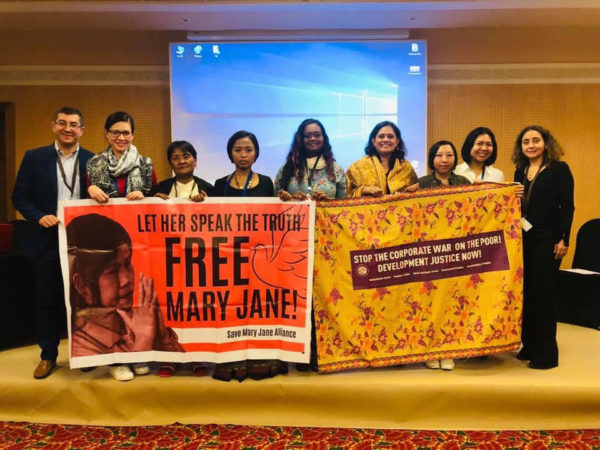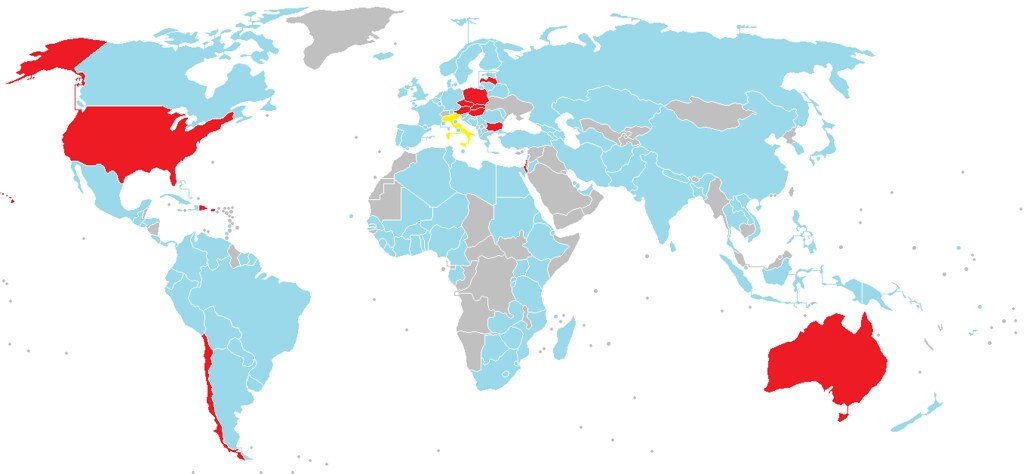12 December 2018
Marrakech, Morocco
As the Global Compact on Migration, a non-binding pact on global migration governance, is being adopted in intergovernmental meeting in Marrakech, Morocco, grassroots women migrants groups in Asia are calling for accountable implementation of the pact that translates into concrete protection for all migrants regardless their status.
The Global Compact on Migration (GCM), due to be formally endorsed by the UN General Assembly in New York in December 2018, sets out 23 objectives for states to better manage migration, including minimising structural drivers of migration, reducing risks for migrants, and ensuring safe and regular pathway. Despite the non-legally binding nature of the pact, a number of countries have withdrawn their agreement to the controversial pact including the U.S., Australia, Austria, Hungary and Chile.

APWLD members in a side event on justice for migrants on a death row during the Global Compact for Migration Conference in Marrakech, Morocco. (Source: Nazma Akter)

Countries' positions for Global Compact for Migration (as of 10 December 2018) (Blue - Will adopt the Compact, Red - Won't adopt the Compact, Yellow - Considering not adopting, Grey - Data incomplete) (Source: Wikipedia)
Erwiana Sulistyaningsih, a victim of labour abuse turned migrant rights advocate and currently an organiser at Kabar Bumi, an association of returnee Indonesian migrants and their families, said “I hope that GCM translates into concrete protection for all migrants despite the glaringly lacking process to engage migrants ourselves in the drafting. Most of migrant workers have never heard of the Global Compact on Migration. The UN needs to do more to reach out and inform migrants of the instrument and the follow-up process after the adoption.”
Erwiana’s case sheds light on the plights of women migrant domestic workers. In 2014, Erwiana was rescued by a fellow migrant at the Hong Kong airport after she suffered eight-month long abuse from her employer. Erwiana was made to work 21 hours per day with no rest day, and given barely sufficient food. After a lengthy investigation, her employer was sentenced to six years imprisonment. She was named 100’s most influence by TIME magazine as an “inspiration” for other migrants to fight against violence and discrimination.
APWLD members in a side event on justice for migrants on a death row during the Global Compact for Migration Conference in Marrakech, Morocco. Photo: Nazma Akter
Glorene Das, Executive Director of Tenaganita, a Malaysian migrant rights organisation, views that GCM needs to be more inclusive in providing protection for all migrants regardless of their status. She said, “The GCM still focuses on how to make migration ‘orderly’ and ‘regular’, but it ignores the reality that a large number of migrants in receiving countries like Malaysia, where majority of migrants are undocumented, are equally entitled to protection. As long as the GCM still endorses seasonal and temporary migration, it will not ensure the rights and protection to migrants as it promises.”
Cherry Clemente, Executive Committee, Migrante International, an alliance of overseas Filipino workers, said “Temporary migration scheme only prioritises the interests of private sectors and businesses who exploit cheap labour without providing social protection and living wage for migrants. The GCM should not serve to legitimise the labour export policies that are prevalent in Asia Pacific countries. Instead, the GCM should prioritise concrete protection and rights of migrants.”
“As the access to UN processes is challenging for grassroots migrants, the GCM must ensure that the voice and direct participation of migrant workers will be at the core of its implementation and monitoring, and not just space dominated by UN agencies, governments or big international NGOs,” said Eni Lestari, APWLD’s Migration Programme Focal Person and Chairperson of International Migrants Alliance – a global alliance of grassroots migrants, immigrants, refugees and displaced people.
“If states are prepared to adopt the GCM, they should, as the first step implement the GCM commitments, ratify the UN Convention on the Protection of the Rights of All Migrant Workers and Members of Their Families,” said Suluck Lamubol, Programme Officer, Asia Pacific Forum on Women, Law and Development (APWLD).
Women migrants groups reiterate that despite the non-binding nature of the agreement, states must follow through the commitment to protect the lives of migrants as set out in the compact, while addressing the drivers of migration including economic inequality, lack of decent work opportunities, climate change, structural violence and conflicts.
About APWLD
Asia Pacific Forum on Women, Law and Development (APWLD) is a leading network of feminist organisations and grassroots activists in Asia Pacific. Our 235 members represent groups of diverse women from 27 countries in Asia Pacific. Over the past 32 years, APWLD has actively worked towards advancing women’s human rights and Development Justice. We are an independent, non-governmental, non-profit organisation and hold consultative status with the United Nations Economic and Social Council.
Prachatai English is an independent, non-profit news outlet committed to covering underreported issues in Thailand, especially about democratization and human rights, despite pressure from the authorities. Your support will ensure that we stay a professional media source and be able to meet the challenges and deliver in-depth reporting.
• Simple steps to support Prachatai English
1. Bank transfer to account “โครงการหนังสือพิมพ์อินเทอร์เน็ต ประชาไท” or “Prachatai Online Newspaper” 091-0-21689-4, Krungthai Bank
2. Or, Transfer money via Paypal, to e-mail address: [email protected], please leave a comment on the transaction as “For Prachatai English”
